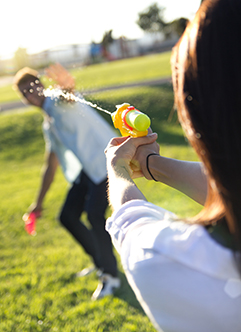Couple Play

Play is not only important for children, it’s important for adults and for couples as well. It helps us to develop vital virtues in our relationship: curiosity, humour, tolerance and resilience.
Curiosity is a vital ingredient in keeping our love fresh, vibrant and open to growth. Couples who let themselves believe that they already know everything about each other, tend to lose interest each other. They become stagnant and bored with each other and begin to look for stimulation elsewhere.
Similarly, a sense of humour helps couples to overcome mishaps and frustrations that otherwise might leave us feeling resentful towards each other. Being able to laugh about our mistakes helps us develop tolerance towards our own and our spouse’s faults and limitations. It helps us to be more forgiving and also more humble. It can turn a disaster into a positive bonding experience.

Couple play helps us bond and develop a bank of positive memories upon which we can draw during the inevitable tough times in a marriage. We remember fondly our newlywed years, when we were setting up our first home and doing all the decorating and furniture refurbishing ourselves…. and on a very tight budget! It was great fun and helped us build a sense of ‘we’. When the newly-hung wallpaper began to peel because we were too thorough in squeezing out the excess glue, we were able to laugh about it instead of blaming each other.
Daydreaming is another form of play of which children are masters and which seems to disappear in our ‘very serious’ married life. Yet how wonderful it is for us to daydream about our lover and playfully anticipate how we might spoil him or her!
Play also helps our love life too! And we’re not necessarily talking about sex-play! Having fun together relaxes us and bonds us, making us more receptive to love making and more playful with each other in the bedroom. Sheila Gray Gregorie recommends play in her blog “To Love Honour and Vacuum” with 14 great suggestions including, dancing, indoor nude volley ball and pillow fights.
How’s your playfulness?
Here’s a quiz to test your Couple Play Quotient:
1 day ago (5), 2-5 days (4), 6-12 days (3), 13+ days (2), Can’t remember (1)
- When was the last time you laughed together?
- When was the last time you had a date?
- When was the last time you tried something different in your love making?
- When was the last time you surprised your spouse with something nice?
- When was the last time you were curious about your spouse’s thoughts on a topic?
- When was the last time you deposited a positive couple memory into your memory bank?
- When was the last time you giggled while making love?
- When was the last time you daydreamed about your spouse?
- When was the last time you danced or sang together?
- When was the last time you shared a recreational activity together?
Add up your score: Anything under 15 means that you are in serious play deficit. It’s time you got serious about play!
Authors: Francine & Byron Pirola
Over to you! What are/were some of the fun things you would do as a couple together? How have you maintained a sense of humor when things go haywire? Tell us in the comments below!
This article featured in the November 2013 edition of the CathFamily e-Magazine. For more, check out:

